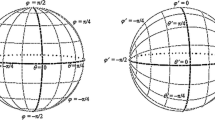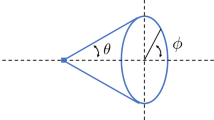Abstract
Kolmogorov's axiomatization of probability includes the familiarratio formula for conditional probability:
\(({\text{RATIO}}) P(A|B) = \frac{{P(A \cap B)}}{{P(B)}}{\text{ }}(P(B) >0).\)
Call this the ratio analysis of conditional probability. It has become so entrenched that it is often referred to as the definition of conditional probability.I argue that it is not even an adequate analysis of that concept. I prove what I call the Four Horn theorem, concluding that every probability assignment has uncountably many ‘trouble spots’. Trouble spots come in four varieties: assignments of zero togenuine possibilities; assignments of infinitesimals to such possibilities; vague assignments to such possibilities; and no assignment whatsoever to such possibilities. Each sort of trouble spot can create serious problems for the ratio analysis. I marshal manyexamples from scientific and philosophical practice against the ratio analysis. I conclude more positively: we should reverse the traditional direction of analysis. Conditional probability should be taken as the primitive notion, and unconditional probability should be analyzed in terms of it.
“I'd probably be famous now If I wasn't such a good waitress.”
Jane Siberry, “Waitress”
Similar content being viewed by others
REFERENCES
Appiah, Anthony: 1985, Assertion and Conditionals, Cambridge University Press, Cambridge.
Carnap, Rudolf: 1952 The Continuum of Inductive Methods, University of Chicago Press.
Carnap, Rudolf: 1963, 'Carnap's Intellectual Autobiography', in Paul Arthur Schilpp (ed.), The Philosophy of Rudolf Carnap, The Library of Living Philosophers, Vol. XI.
Cartwright, Nancy: 1979, 'Causal Laws and Effective Strategies', Noûs 13, 419–437.
Cartwright, Nancy: 1999, The Dappled World, Cambridge University Press, Cambridge.
Cushing, James T. and Ernan McMullin (eds.): 1989, Philosophical Consequences of Quantum Theory-Reflections on Bell's Theorem, University of Notre Dame Press, Indiana, pp. 224–253.
de Finetti, Bruno: 1972, Probability, Induction and Statistics, Wiley, New York.
de Finetti, Bruno: 1980, 'Foresight: Its Logical Laws, Its Subjective Sources', in Henry E. Kyburg, Jr. and Howard E. Smokler (eds.), Studies in Subjective Probability, Robert E. Krieger Publishing Company, pp. 53–118.
de Finetti, Bruno: 1990 (originally published 1974), Theory of Probability, Vol. 1, Wiley Classics Library, John Wiley & Sons.
Earman, John: 1992, Bayes or Bust?, MIT Press.
Edgington, Dorothy: 1995, 'On Conditionals', Mind 104, 235–329.
Edgington, Dorothy: 1996, 'Lowe on Conditional Probability', Mind 105, 617–630.
Edwards, W., Lindman, H., and Savage, L. J.: 1963, 'Bayesian Statistical Inference for Psychological Research', Psychological Review LXX, 193–242.
Eells, Ellery: 1991, Probabilistic Causality, Cambridge University Press, Cambridge.
Etchemendy, John: 1990, The Concept of Logical Consequence, Harvard University Press.
Fetzer, James: 1983, 'Probability and Objectivity in Deterministic and Indeterministic Situations', Synthese 57, 367–386.
Fine, Arthur: 1989, 'Do Correlations Need to be Explained?', in Cushing and McMullin, pp. 175–194.
Fine, Terrence: 1973, Theories of Probability, Academic Press.
Gaifman, Haim:1988, 'A Theory of Higher Order Probabilities', in Brian Skyrms and William L. Harper (eds.), Causation, Chance, and Credence, Kluwer Academic Publishers, pp. 191–219.
Gillies, Donald: 2000, 'Varieties of Propensity', British Journal for the Philosophy of Science 51, 807–835.
Gilboa, Itzhak: 1994, 'Can Free Choice Be Known?', in C. Bicchieri, R. Jeffrey and B. Skyrms (eds.), The Logic of Strategy, Oxford University Press.
Goldstein, M.: 1983, 'The Prevision of a Prevision', Journal of the American Statistical Association 78, 817–819.
Hacking, Ian: 1965, The Logic of Statistical Inference, Cambridge University Press, Cambridge.
Hájek, Alan: 1997, '“Mises Redux”-Redux: Fifteen Arguments Against Finite Frequentism', Erkenntnis 45, 209–227.
Howard, Don: 1989, 'Holism, Separability and the Metaphysical Implications of the Bell Experiments', in Cushing and McMullin.
Howson, Colin and Peter Urbach: 1993, Scientific Reasoning: The Bayesian Approach, Open Court, 2nd edition.
Jackson, Frank: 1987, Conditionals, Blackwell.
Jarrett, Jon P.: 1989, 'Bell's Theorem: A Guide to the Implications', in Cushing and McMullin, pp. 60–79.
Jeffrey, Richard: 1983a, 'Bayesianism with a Human Face', in John Earman (ed.), Testing Scientific Theories, Minnesota Studies in the Philosophy of Science, vol. X, pp. 133–156.
Jeffrey, Richard: 1983b, The Logic of Decision, 2nd ed., University of Chicago Press.
Jeffreys, Harold: 1961, Theory of Probability, 3rd ed., Oxford, Clarendon Press.
Johnson, W. E.: 1921, Logic, Cambridge University Press.
Keynes, John Maynard: 1921, A Treatise on Probability, Macmillan and co.
Kemeny, J.: 1955, 'Fair Bets and Inductive Probabilities', Journal of Symbolic Logic 20, 263–273.
Kolmogorov, A. N.: 1933, Grundbegriffe der Wahrscheinlichkeitrechnung, Ergebnisse Der Mathematik; translated as Foundations of Probability, Chelsea Publishing Company, 1950.
Kyburg, Henry: 1988, 'Powers', in William L. Harper and Brian Skyrms (eds.), Causation in Decision, Belief Change, and Statistics, Kluwer Academic Publishers, pp. 71–82.
Levi, Isaac: 1974, 'On Indeterminate Probabilities', The Journal of Philosophy 71, 391–418.
Levi, Isaac: 1978, 'Coherence, Regularity and Conditional Probability', Theory and Decision 9, 1–15.
Levi, Isaac: 1980, The Enterprise of Knowledge, The MIT Press.
Levi, Isaac: 1997, The Covenant of Reason: Rationality and the Commitments of Thought, Cambridge University Press.
Lewis, David: 1973, Counterfactuals, Harvard University Press, Cambridge, Massachusetts.
Lewis, David: 1980, 'A Subjectivist's Guide to Objective Chance', in Studies in Inductive Logic and Probability, Vol. II., University of California Press, pp. 263–293; reprinted in Lewis 1986b.
Lewis, David: 1986a, 'Probabilities of Conditionals and Conditional Probabilities II', Philosophical Review 95, 581–589.
Lewis, David: 1986b, Philosophical Papers Volume II, Oxford University Press.
Lewis, David: 1986c, On the Plurality of Worlds, Blackwell.
Lewis, David: 1994a, 'Reduction of Mind', in Samuel Guttenplan (ed.), A Companion to the Philosophy of Mind, Blackwell, pp. 412–431.
Lewis, David: 1994b, 'Humean Supervenience Debugged', Mind 103, 473–490.
Lindstrøm, Tom: 1988, 'An Invitation to Nonstandard Analysis', in Nigel Cutland (ed.), Nonstandard Analysis and its Applications, pp. 1–105.
Mellor, D. H.: 1971, The Matter of Chance, Cambridge University Press, Cambridge.
Mellor, D. H.: 1993, 'How to Believe a Conditional', Journal of Philosophy 90, 233–248.
Pearl, Judea: 1988, Probabilistic Reasoning in Intelligent Systems, Morgan-Kaufman.
Pitowski, Itamar: 1989, Quantum Probability-Quantum Logic, Springer-Verlag.
Popper, Karl: 1959a, 'The Propensity Interpretation of Probability', British Journal of the Philosophy of Science 10, 25–42.
Popper, Karl: 1959b, The Logic of Scientific Discovery, Basic Books; reprint edition 1992, Routledge.
Price, Huw: 1986, 'Conditional Credence', Mind 95, 18–36.
Ramsey, F. P.: 1926, 'Truth and Probability', in R. B. Braithwaite (ed.), Foundations of Mathematics and other Essays, Routledge & Kegan Paul, 1931, pp. 156–198; reprinted in Henry E. Kyburg, Jr. and Howard E. Smokler (eds.), Studies in Subjective Probability, 2nd ed., Robert E. Krieger Publishing Company, 1980, pp. 23–52; reprinted in D. H.
Mellor (ed.), Philosophical Papers, Cambridge University Press, Cambridge, 1990, pp. 52–96.
Reichenbach, Hans: 1949, The Theory of Probability, University of California Press, Berkeley.
Renyi, Alfred: 1970, Foundations of Probability, Holden-Day, Inc.
Robinson, Abraham: 1966, Non-Standard Analysis, North Holland Publishing Company, Amsterdam.
Roeper, P. and H. Leblanc: 1999, Probability Theory and Probability Logic, University of Toronto Press.
Rosenkrantz, R. D.: 1981, Foundations and Applications of Inductive Probability, Ridgeview Publishing Company.
Salmon, Wesley: 1980, 'Probabilistic Causality', Pacific Philosophical Quarterly 61, 50–74.
Savage, L. J.: 1954, The Foundations of Statistics, John Wiley.
Schervish, M., T. Seidenfeld, and J. Kadane: 1984, 'The Extent of Non-Conglomerability of Finitely Additive Probability', Z.War. 66, 205–226.
Seidenfeld, T.: 2001, 'Remarks on the Theory of Conditional Probability: Some Issues of Finite Versus Countable Additivity', in V. F. Hendricks et al. (eds.), Probability Theory, Kluwer Academic Publishers, pp. 167–178.
Seidenfeld, Teddy, Mark J. Schervish, and Joseph B. Kadane: 2001, 'Improper Regular Conditional Distributions', The Annals of Probability 29(4), 1612–1624.
Shimony, Abner: 1970, 'Scientific Inference', in Robert Colodny (ed.), The Nature and Function of Scientific Theories, University of Pittsburgh Press.
Skyrms, Brian: 1980, Causal Necessity, Yale University Press.
Skyrms, Brian: 1995, 'Strict Coherence, Sigma Coherence and the Metaphysics of Quantity', Philosophical Studies 77, 39–56.
Skyrms, Brian: 2000, Choice and Chance, Wadsworth, Inc, 4th ed.
Spohn,Wolfgang: 1977, 'Where Luce and Krantz Do Really Generalize Savage's Decision Model', Erkenntnis 11, 113–134.
Spohn, Wolfgang: 1986, 'The Representation of Popper Measures', Topoi 5, 69–74.
Stalnaker, Robert: 1970, 'Probabilities and Conditionals', Philosophy of Science 37, 64–80.
Suppes, Patrick: 1970, A Probabilistic Theory of Causality, North Holland Publishing Company, Amsterdam.
Tarski, Alfred: 1956, 'On the Concept of Logical Consequence', in Logic, Semantics, Metamathematics, Oxford: Clarendon Press; Hackett Publishing Company, Indianapolis, Indiana, 1983. (Trans. by J. H. Woodger, 2nd. ed. edited and introduced by John Corcoran.)
van Fraassen, Bas: 1984, 'Belief and the Will', Journal of Philosophy 81, 235–256.
van Fraassen, Bas: 1989, Laws and Symmetry, Clarendon Press, Oxford.
van Fraassen, Bas: 1990, 'Figures in a Probability Landscape', in J.M. Dunn and A. Gupta (eds.), Truth or Consequences, Kluwer, pp. 345–356.
van Fraassen, Bas: 1991, Quantum Mechanics-An Empiricist View, Clarendon Press, Oxford.
van Fraassen, Bas: 1995a, 'Belief and the Problem of Ulysses and the Sirens', Philosophical Studies 77, 7–37.
van Fraassen, Bas: 1995b, 'Fine-Grained Opinion, Conditional Probability, and the Logic of Belief', Journal of Philosophical Logic 24, 349–377.
Rights and permissions
About this article
Cite this article
Hájek, A. What Conditional Probability Could Not Be. Synthese 137, 273–323 (2003). https://doi.org/10.1023/B:SYNT.0000004904.91112.16
Issue Date:
DOI: https://doi.org/10.1023/B:SYNT.0000004904.91112.16




